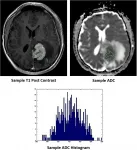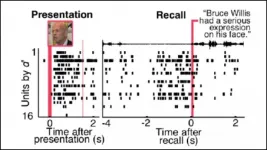(Press-News.org) Mindfulness courses can reduce anxiety, depression and stress and increase mental wellbeing within most but not all non-clinical settings, say a team of researchers at the University of Cambridge. They also found that mindfulness may be no better than other practices aimed at improving mental health and wellbeing.
Mindfulness is typically defined as 'the awareness that emerges through paying attention on purpose, in the present moment, and nonjudgmentally to the unfolding of experience moment by moment'. It has become increasingly popular in recent years as a way of increasing wellbeing and reducing stress levels.
In the UK, the National Health Service offers therapies based on mindfulness to help treat mental health issues such as depression and suicidal thoughts. However, the majority of people who practice mindfulness learn their skills in community settings such as universities, workplaces, or private courses. Mindfulness-based programmes are frequently promoted as the go-to universal tool to reduce stress and increase wellbeing, accessible to anyone, anywhere.
Many randomised controlled trials (RCTs) have been conducted around the world to assess whether in-person mindfulness training can improve mental health and wellbeing, but the results are often varied. In a report published today in PLOS Medicine, a team of researchers from the Department of Psychiatry at the University of Cambridge led a systematic review and meta-analysis to examine the published data from the RCTs. This approach allows them to bring together existing - and often contradictory or under-powered - studies to provide more robust conclusions.
The team identified 136 RCTs on mindfulness training for mental health promotion in community settings. These trials included 11,605 participants aged 18 to 73 years from 29 countries, more than three-quarters (77%) of whom were women.
The researchers found that in most community settings, compared with doing nothing, mindfulness reduces anxiety, depression and stress, and increases wellbeing. However, the data suggested that in more than one in 20 trials settings, mindfulness-based programmes may not improve anxiety and depression.
Dr Julieta Galante from the Department of Psychiatry at the University of Cambridge, the report's first author, said: "For the average person and setting, practising mindfulness appears to be better than doing nothing for improving our mental health, particularly when it comes to depression, anxiety and psychological distress - but we shouldn't assume that it works for everyone, everywhere.
"Mindfulness training in the community needs to be implemented with care. Community mindfulness courses should be just one option among others, and the range of effects should be researched as courses are implemented in new settings. The courses that work best may be those aimed at people who are most stressed or in stressful situations, for example health workers, as they appear to see the biggest benefit."
The researchers caution that RCTs in this field tended to be of poor quality, so the combined results may not represent the true effects. For example, many participants stopped attending mindfulness courses and were not asked why, so they are not represented in the results. When the researchers repeated the analyses including only the higher quality studies, mindfulness only showed effects on stress, not on wellbeing, depression or anxiety.
When compared against other 'feel good' practices such as exercise, mindfulness fared neither better nor worse. Professor Peter Jones, also from Cambridge's Department of Psychiatry, and senior author, said: "While mindfulness is often better than taking no action, we found that there may be other effective ways of improving our mental health and wellbeing, such as exercise. In many cases, these may prove to be more suitable alternatives if they are more effective, culturally more acceptable or are more feasible or cost effective to implement. The good news is that there are now more options."
The researchers say that the variability in the success of different mindfulness-based programmes identified among the RCTs may be down to a number of reasons, including how, where and by whom they are implemented as well as at whom they are targeted. The techniques and frameworks taught in mindfulness have rich and diverse backgrounds, from early Buddhist psychology and meditation through to cognitive neuroscience and participatory medicine - the interplay between all of these different factors can be expected to influence how effective a programme is.
The number of online mindfulness courses has increased rapidly, accelerated further by the COVID-19 pandemic. Although this review has not looked at online courses, studies suggest that these may be as effective as their offline counterparts, despite most lacking interactions with teacher and peers.
Dr Galante added: "If the effects of online mindfulness courses vary as widely according to the setting as their offline counterparts, then the lack of human support they offer could cause potential problems. We need more research before we can be confident about their effectiveness and safety."
INFORMATION:
The research was funded by the National Institute for Health Research (NIHR) Applied Research Collaboration East of England and NIHR Cambridge Biomedical Research Centre, with additional support from the Cambridgeshire & Peterborough NHS Foundation Trust, Medical Research Council, Wellcome and the Spanish Ministry of Education, Culture and Sport.
Reference
Galante, J et al. Mindfulness-based programmes for mental health promotion in adults in non-clinical settings: A systematic review and meta-analysis of randomised controlled trials. PLOS Medicine; 11 Jan 2021; DOI: 10.1371/journal.pmed.1003481
Deaths from ischemic heart disease and hypertensive diseases in the United States increased during the COVID-19 pandemic over the prior year, while globally, COVID-19 was associated with significant disruptions in cardiovascular disease testing. These findings are from two papers publishing in the Journal of the American College of Cardiology that examined the indirect effects of the pandemic on cardiovascular disease patients and their care.
The impact of the COVID-19 pandemic has been substantial, but there are concerns about the indirect impact of the pandemic as well, particularly for heart disease patients. Many reports have suggested that large mortality increases during the pandemic cannot be explained by COVID-19 alone. During the height of stay-at-home orders in the U.S., hospitals ...
HOUSTON - (Jan. 11, 2021) - An atypical two-dimensional sandwich has the tasty part on the outside for scientists and engineers developing multifunctional nanodevices.
An atom-thin layer of semiconductor antimony paired with ferroelectric indium selenide would display unique properties depending on the side and polarization by an external electric field.
The field could be used to stabilize indium selenide's polarization, a long-sought property that tends to be wrecked by internal fields in materials like perovskites but would be highly useful for solar energy applications.
Calculations by Rice materials theorist Boris Yakobson, lead author and researcher Jun-Jie Zhang and graduate student Dongyang Zhu shows switching the material's polarization with an external electric field makes ...
MDC researchers have developed a new approach to CAR T-cell therapy. The team has shown in Nature Communications that the procedure is very effective, especially when it comes to fighting follicular lymphomas and chronic lymphocytic leukemia, the most common type of blood cancer in adults.
The body's defense system generally does not recognize cancer cells as dangerous. To correct this sometimes fatal error, researchers are investigating a clever new idea, one that involves taking a handful of immune cells from cancer patients and "upgrading" them in the laboratory so that they recognize certain surface proteins in the malignant cells. The researchers then multiply ...
Stress on an expectant mother could affect her baby's chance of developing disease - perhaps even over the course of the child's life, UC researchers have found.
Psychosocial factors creating stress -- such as lack of social support, loneliness, marriage status or bereavement -- may be mutating their child's mitochondrial DNA and could be a precursor to a host of diseases, according to a University of Cincinnati study.
"There are a lot of conditions that start in childhood that have ties to mitochondrial dysfunction including asthma, obesity, attention deficit hyperactivity ...
BUFFALO, N.Y. -- University at Buffalo researchers are reporting an advancement of a chemical sensing chip that could lead to handheld devices that detect trace chemicals -- everything from illicit drugs to pollution -- as quickly as a breathalyzer identifies alcohol.
The chip, which also may have uses in food safety monitoring, anti-counterfeiting and other fields where trace chemicals are analyzed, is described in a study that appears on the cover of the Dec. 17 edition of the journal Advanced Optical Materials.
"There is a great need for portable and cost-effective chemical sensors ...
Pregnant women who exercise more during the first trimester of pregnancy may have a lower risk of developing gestational diabetes, according to a new study led by Samantha Ehrlich, an assistant professor in the Department of Public Health at the University of Tennessee, Knoxville, and adjunct investigator with the Kaiser Permanente Division of Research. The analysis found that lower risk was associated with at least 38 minutes of moderate intensity exercise each day--a bit more than current recommendations of at least 30 minutes a day five days a week.
Gestational diabetes refers to diabetes diagnosed for the first time during pregnancy. It can pose serious health problems including pregnancy and delivery complications as well as increased future risk for diabetes ...
The cover for issue 45 of Oncotarget features Figure 3, "Representative images of whole tumor volume segmentation of the co-registered T1 post-contrast sequence and apparent diffusion coefficient (ADC) map, yielding the corresponding ADC histogram distribution utilized for data analysis," recently published in "Diffusion-weighted MR imaging histogram analysis in HIV positive and negative patients with primary central nervous system lymphoma as a predictor of outcome and tumor proliferation" by Khan, et al.
This authors reported that the aim of this study is to investigate the correlation between ...
Face-sensitive neurons in humans employ distinct activity patterns to encode individual faces; those patterns reactivate when imagining the face, according to research recently published in JNeurosci.
Human social interaction hinges on faces. In fact, faces are so important that the brain contains entire regions in the ventral temporal cortex devoted to facial recognition. In humans, the fusiform facial area activates in response to faces, and monkeys have single neurons that fire when shown a face. However, experimental limitations have prevented us from knowing how the human brain responds to and processes faces at the level of the single neuron.
To close this gap, Khuvis et al. measured the electrical activity of neurons in the ventral temporal ...
HOUSTON - (Jan. 11, 2021) - Rice University engineers hope to make life better for those with replacement joints by modeling how artificial hips are likely to rub them the wrong way.
The computational study by the Brown School of Engineering lab of mechanical engineer Fred Higgs simulates and tracks how hips evolve, uniquely incorporating fluid dynamics and roughness of the joint surfaces as well as factors clinicians typically use to predict how well implants will stand up over their expected 15-year lifetime.
The team's immediate goal is to advance the design of more robust prostheses.
Ultimately, they say the model could help clinicians personalize hip joints for patients depending on gender, ...
In most animal species, if a major artery is cut off from the heart, the animal will struggle to survive. The same can be said for many of our critical infrastructure systems, such as electric power, water and communications. They are networked systems with vulnerable connections.
This vulnerability was on display in September 2017 when Hurricane Maria wrecked Puerto Rico's electric power grid, leaving almost all of the island's 3.3 million people without electricity. The months-long blackout that followed was the worst in U.S. history.
Claire Trevisan, ...






